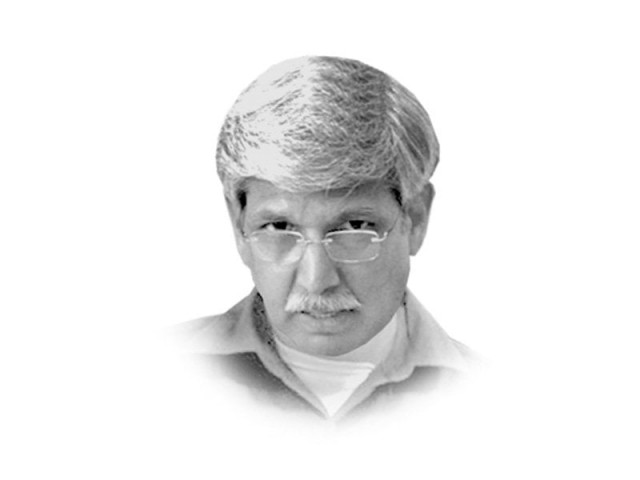Budgeting Pakistan
In choosing infrastructure, communication, energy, govt has chosen its 3 planks of reviving the economy

The writer is a political and security analyst who retired as an air vice-marshal in the Pakistan Air Force
After the finance minister had presented the Budget in Parliament, a budding ‘Christiane Amanpour’ of the Pakistani media scene picked up the threads where others had yet failed to tread. She asked of her equally assured guest if she (the guest) had noted how cleverly the entire Budget been allocated for Security. Please note that of late ‘security’ and ‘defence’ are synonymous in Pakistan. ‘Defence’ of course being the nom de guerre for the military and the defence forces of Pakistan. She counted the Rangers, the Frontier Corps, the civil armed forces, civil defence, intelligence, and the strategic nuclear capability under the singular hat of ‘security’ and thus ‘defence’. Which still is kind of passable given the level of ‘security intellect’ that most in the media exhibit. And since their default discussion on Budget includes ‘defence’ only, the more important allocations — education, health, subsidy or growth — miss out.
What came later was earth shattering: she went on to propose that allocations made in the Budget for the settlement of the Zarb-e-Azb IDPs, too, should be counted in the defence allocations because of the implied linkage. And wait for it: the entire Public Sector Development Programme to her was an inescapable conspiracy to burgeon the defence spending because when the government wishes to build roads and bridges and highways to link the country, ostensibly in pursuit of the China-Pakistan Corridor, it inalienably is something that the military and the ‘defence’ secretly covets as its strategy to secure Pakistan. To our very own ‘Amanpour’ then, any allocation to the military is money lost and thus outlandish. She clearly makes that traditional case for ‘Guns Vs Butter’ but hardly ever discusses Butter in any manifestation. This is generic, though. Two, to her discerning mind what is for ‘security’ is for ‘defence’. Here is a bit of a tongue-twisting contortion: what is for the security of the nation and the state may add to the defence of the nation and the state; and what may ‘defend’ the nation and the state may alternatively add to the security of the nation and the state.
To be fair, what the young lady said is not farther from the truth. The question is only whether the formulation is a disingenuous framing of the ‘defence’, or a distilled truth borne of a deep understanding of what the above tongue-twisting contortion reflects. But then she is young and she will learn. Comprehensive national security for any nation, not Pakistan alone, is a composition of the traditional and the non-traditional. While the traditional is well understood in Pakistan with all its associated subsets, it is the non-traditional that has yet to be dealt with. Energy security, food security, security from disease and poverty, even job security which inalterably means that the economy is good enough to not only enable jobs to most eligible, it can also sustain their engagements ensuring security of livelihood, are all subsets of the composite security matrix. And each adds to the whole, important in its own right.
My problem though is quite different. I see what the government is intending to do here, and there seems some method to this madness. In choosing infrastructure, communication and energy, the government has chosen its three planks of reviving the economy. It all might be a convenient dividend from the CPEC but it has the making of a strategy which can trigger motion in the economy. In 2008 and after, when recession hit, major economies with liquidity chose to keep the wheels moving by investing in infrastructure. China did; the US could only partially move some funds but there was huge input as impetus on the Wall Street. Again, China, with highest liquid money in the world, has chosen to invest through the CPEC in what is important to it for its own ‘security’, but what entails is a God given opportunity for Pakistan to value-add to it by dovetailing its own meagre resources in synergy with what dividends are likely to accrue from this venture. Connectivity moves ideas, people and trade; all are good to move nations. Who knows it just might lead to better integration, and cohesion only adds to security; both traditional and non-traditional.
Yes, my problem; and this I pose as an issue for those who know. Greece is advised austerity but shuns it; as are Spain, Portugal and Ireland - they too shun it. In fact, Ireland makes a joke of it by spending their way to recovery giving some credence to the forces of market economy, but what may one do with nations such as Pakistan where the economy is strung at two unbridgeable extremes. This tension between the subsidy side of the economy as a social need against growth which underpins prosperity and is the central pillar of modern economics, ends up neutralising the other. We remain stuck in the hybrid and may do well by bringing back the old coinage, mixed economy, to correctly denote our constraints. The word is still out on how the market can be made more empathic; but the moment you move left, right seems irrelevant. The issue then emerges of the Private Vs Public as the primary owner and motivator of the economy. Even more significantly, how do you grow with subsidy? Surely, not fast enough. And if so, where are we heading in terms of providing comprehensive security. Education and health yet not in the mix.
Published in The Express Tribune, June 13th, 2015.
Like Opinion & Editorial on Facebook, follow @ETOpEd on Twitter to receive all updates on all our daily pieces.














COMMENTS
Comments are moderated and generally will be posted if they are on-topic and not abusive.
For more information, please see our Comments FAQ